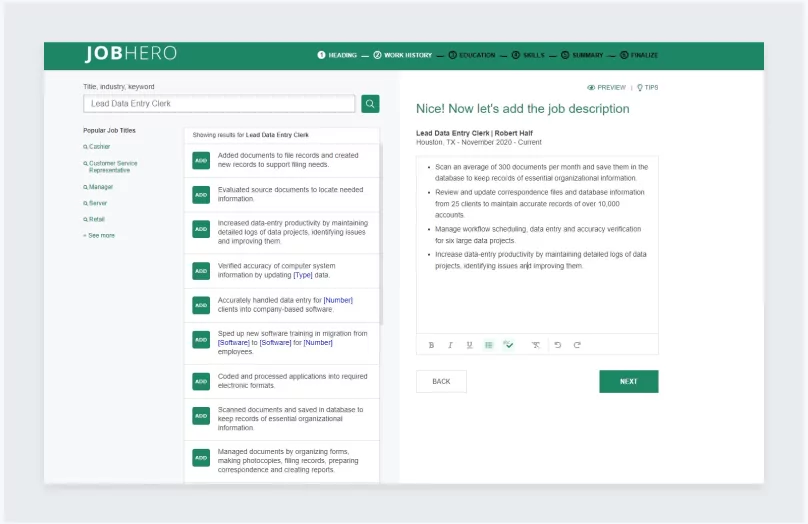Become a case manager if you have a passion for people and a desire to help make a difference in people’s lives. This guide shows you how to develop the education and skills needed to pursue this field and the responsibilities and salaries you could earn in social work.
Our certified resume writers have created a library of resume samples to show you exactly what a strong resume looks like. Use them as-is or customize them to your needs.
Improve your application with a personal message! Your resume may summarize your qualifications, but a cover letter can help you express your professional accomplishments and working style. Pair these cover letter templates with our builder subscription to unlock AI-powered text templates and professional designs that will help you submit a complete application.

Create your professional resume in just minutes.
- Choose from 20+ recommended templates
- Add pre-written experiences, skills and summary
- Download and send
What Does A Case Manager Do?
The simple answer is that a case manager helps people solve problems. A case manager can work in a variety of settings. A popular field is health care, but a case manager can also work with immigration, the unhoused, children or recovering addicts.
Some other entry points into the case management field include:
Correctional Case Manager
Forensic Case Manager
Geriatric Case Manager
Juvenile Case Manager
Rehabilitation Case Manager
Legal Case Manager
Substance Abuse Case Manager
Clinical Case Manager
Mental Health Case Manager
Social Work Case Manager
Medical Case Manager
Nurse Case Manager
Being a case manager requires a high level of empathy and good communication skills. Some typical tasks include, but are not limited to:
Working with community leaders and memes to identify a neighborhood’s needed programs and services.
Suggesting and implementing improvements to local programs and services.
Working with their clients to identify personal or environmental problems and create a plan of action for solving them.
Clerical tasks, such as filing paperwork and scheduling client appointments.
Strategic tasks include determining the cause of client problems and crafting action plans.
Interpersonal tasks, including meetings with care team members and clients.
Writing proposals for additional social service funding.
Writing proposals or letters of support/recommendations for clients.
How Do You Become a Case Manager
According to the Bureau of Labor Statistics, the demand for social workers may increase by 9% through 2031. This increase will result in approximately 74,800 new jobs being filled during that period. This forecasted increase results from a growing population, which increases demand for social services.
Case managers are most likely to find jobs in hospitals, nursing homes and mental health facilities. There are openings at nonprofits that work with recovering addicts, abused children and rehabilitating criminals. Since the case management field is broad, there is not one specific path one must take in academia to become a case manager. However, you can follow these steps to become a case manager:
Decide what type of casework you’re interested in:
Case managers work in various settings, including child welfare, human services, health care providers or schools, correctional facilities, substance abuse and rehabilitation and nursing. The work environment will determine what academic and training path you should follow.
Earn your college degrees:
According to our research, case managers are generally required to hold a four-year bachelor’s degree to qualify for entry-level positions. The Council on Social Work Education has a comprehensive list of accredited social work programs to help you find the right school for your budget. Any field of study is acceptable, but pursuing a degree in policy and social services, social science, sociology, political science or psychology may be helpful.
If you’re interested in clinical social work, you may need to pursue an additional master’s degree in social work. These two-year programs help you prepare for specialized fieldwork and help develop your clinical assessment and diagnostic skills.
Apply for internships:
Most bachelor’s and master’s require internships to help you develop hands-on negotiation, case management and crisis management skills. Internships can also help you explore your chosen field of interest and decide if it’s the right path.
Strengthen your resume and skills with specialized certifications:
A case manager Certification can be a job requirement for some employers, and it is often necessary to progress beyond entry-level. You gain additional helpful training and experience when you pursue a case manager certification.
Apply for a specialized license if required by the state:
If you pursue a clinical or family assistance job, you may need a license to practice. The application requirements can vary by state. The Association of Social Work Boards has comprehensive information about each state's regulatory requirements.
Find your first full-time case manager position:
Once you finalize your education and earn some practical experience, you can demonstrate this via your resume. Try using these case manager resume samples and an outline guide for describing your qualifications, or use an AI-powered Resume Builder to craft a job-ready resume in a few short questions.
Once your resume is ready, search online for case manager job opportunities. Be sure to utilize your network as well — a strong referral goes a long way!
Case Manager Skills
Case management is a career path where people skills reign supreme. A case manager should have a passion for helping people succeed and a love for solving problems.
Hard skills:
Soft skills:
Insights From A Case Manager
In order to paint a better picture of life as a Case Manager, we talked to Christopher Gerhart, a certified Substance Abuse Case Manager in Little Rock, Arkansas with over 20 years of experience. Here’s what Christopher had to say.
What is the common career path for a Case Manager?
For a lot of case managers, a common path involves working on, and /or getting a degree at some level in a human service field such as mental health, counseling, substance abuse, criminal justice. Very often, this is an entry-level, not very well paid position.
What should someone consider before becoming a Case Manager?
One of the biggest considerations is that one person will never be able to meet everyone's needs. The way I see it there are four main areas of life, which I call The 4 L's: Liver, Lover, Livelihood and Legal. These are the reasons people seek help.
What type of person excels in this job?
Someone who excels in this sort of position is the same sort of person who makes a great salesperson. They have a quick memory, skillfully integrate coordination of services and they seem to know everybody
What are some of the most important skills for Case Managers to have?
Networking, both in person and electronically, formally and informally is a vital skill to be successful. A case manager's supervisor may need to take into consideration this idea because the case manager's ability to be effective relies heavily upon their connections with members of the community and these days many of those connections are made and maintained on social media. An effective case manager MUST be involved in the community, not just one community, but all communities. This includes employers, housing providers, medical services, legal services, food banks, faith groups, interfaith groups, professional helping organizations and informal networks.
What do you find to be the most rewarding aspect of being a Case Manager?
Absolutely the most rewarding thing about being a case manager is someone running into me years later, in another context such as the grocery store, PTA or homeowners association, often that I had absolutely forgotten, and telling me that I helped make a difference in their lives when they were having a tough time.
How Much Do Case Managers Get Paid?
The median salary for Case Managers is $35,500. The highest 10 percent of the spectrum earned more than $76,820, while the lowest 10 percent of the spectrum earned less than $28,530.
Top 10 States for Case Manager Salaries
Here is a list of the top ten states with the highest median Case Manager salaries.
Case Manager Resources
Are you ready to continue your exploration of Case Management? If so, then check out this list of awesome Case Manager resources.
Professional Groups
American Case Management Association
This group provides professional development for members in the form of mentorship and networking opportunities, and it also has a large database of educational resources available to members.
Case Management Society of America
This group prides itself on being a hub of intellectual diffusion between its members. It provides many networking and collaboration ideas and opportunities.
Web Resources
RNCaseManager.com
This is a great website for those considering the subfield of Nurse Case Manager. It contains tons of information on what it is like to be a Case Manager in a Healthcare setting.
National Association of Case Management
This site not only has excellent information, but it serves as a hub for one of the most popular Case Management conferences in the country.




